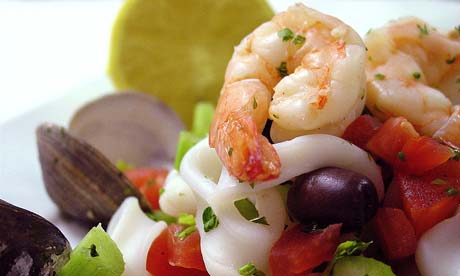
Exotic food: the best thing about travel – and one of the world's biggest potential health pitfalls. How to cope with the world's weirdest cuisines
What happens when you go abroad and your diet is taken out of your control? What foods are dangerous? And what can you do to prepare your body for a gut-stressing trip?
Vitamins and probiotics are marketed so heavily you might assume that stocking up on friendly bacteria and multivitamins before your travels will help with fighting off exotic infections.
Disappointingly, evidence doesn’t back up these claims. What benefits a body most is regular meals and a varied diet. Those who don’t have breakfast would do better to rethink their morning meal strategy than to buy nutritional supplements – people eating anything approaching a normal mixed diet containing enough calories are unlikely to be vitamin deficient. In fact, unless you have a medical condition that stops you absorbing food properly, it is quite difficult to become vitamin deficient.
Two nutrients – or rather the lack of them – do cause occasional problems. Vitamin C is water soluble and not stored in the body, so if you eat a diet lacking in fresh vegetables and/or fruit for some months you can develop scurvy. Anyone venturing into regions where fresh food is scarce – desert regions or tundra – might want to pack vitamin C tablets. These have the added benefit of acidifying urine – useful for treating cystitis.
The second key nutrient is iron. Women of child-bearing age who don’t eat meat can run down their iron supplies and may need supplements.
Preliminary studies on supplements of lactobacilli and other ‘friendly bacteria’ were exciting, promising health improvements. However, although such supplements are excellent and can speed healing if taken after a course of antibiotics or a bout of profuse diarrhoea, people who are in normal health are unlikely to benefit.
There may be some sense in taking lactobacilli in capsule form (such as Culturelle) to rehabilitate after a bout of the trots; the same end is achieved by a drink such as Yakult, but this is bulkier to pack. I like eating fresh local yoghurt; however, it isn’t always available when you’re travelling.
Health experts try to discourage people from taking too much salt – it has a small but significant effect in raising blood pressure and, especially among sedentary Westerners, high blood pressure increases the risk of heart disease and stroke. However, travellers to hot climates need to ensure they don’t become salt deficient. Salt is lost in sweat, so you need to consume more salt in the tropics. Travellers in a sweaty environment, especially before they have heat-acclimatised, need plenty – if you develop a taste for putting more salt on your food, listen to your body and do just that. Salt tablets are not necessary.
Avoid shellfish if you’re far from the sea (even if it has been frozen) and in a region of intermittent electricity supply. Even when it’s fresh, there can be problems. Increasing coastal pollution leads to contamination of filter-feeders (molluscs, lobsters, etc); vomiting and diarrhoea are relatively common outcomes. Occasionally scary or weird effects result.
Toxins from shellfish can poison the nerves and – in rare instances – cause a kind of short-lived paralysis or, strangest of all, a change in temperature sensation so that hot things feel cold to the touch and cold things feel burning hot! This can last for months and was initially thought to be some kind of psychiatric condition until it was properly recognised and given the name of ciguatera.
A related poisoning arises from eating not-quite-fresh tuna, mackerel and their relatives (bonito, skipjack and albacore). It is most prevalent in hot climates where fish start to decompose rapidly. Scrombrotoxin causes a tingling or smarting sensation in the mouth, or a peppery/bitter taste to the fish. If you continue eating you’ll next notice skin-flushing, sweating, itching, abdominal pain, vomiting and dizziness. Symptoms settle in 24 hours and no treatment is necessary.
Lots of travellers fall ill while abroad; estimates vary according to destination, from around 8% in North America and northern Europe to 30% in southern Europe in the summer months and over 50% in some resource-poor destinations. Apart from the inevitable colds and sore throats, most of these illnesses result from foods that have been prepared under poor hygiene conditions or have been contaminated at other stages. However, thooughly cooked and piping-hot dishes are almost invariably safe.
One polite way of refusing doubtful foods is to say that you are fasting that day.